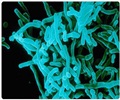A Bangladesh-based study, facilitated by the World Health Organisation (WHO), has urged the introduction of large-scale HIB vaccination. But is there any genuine need in India?
Haemophilus influenzae type B (HIB) is a type of bacteria responsible for a range of serious "invasive" diseases including meningitis with the potential brain damage and epiglottitis, a life-threatening disease.
The epiglottis is the piece of cartilage at the back of the tongue that closes off the windpipe when swallowing. Without an epiglottis, food could enter the airways, and you would cough or choke after swallowing. Epiglottitis causes swelling of the epiglottis. Breathing problems increases rapidly as the epiglottis swells.Now the World Health Organization (WHO) is plugging for large-scale HIB vaccination to protect children against meningitis and pneumonia. But quite a few question the need for it in a country like India where meningitis incidence. Also the vaccine is quite expensive.
A Bangladesh-based study, published in The Pediatric Infectious Disease Journal, has claimed the vaccine can prevent over a third of pneumonia cases and approximately 90 percent of HIB meningitis cases, thus saving the lives of thousands of children. Although both diseases are a concern in countries with high infant mortality rates, it has not been proved the haemophilus bacteria is a major factor in their spread.
Besides The Invasive Bacterial Infections Surveillance (IBIS) Group study, performed over four years in six referral hospitals across India, had revealed a remarkably low incidence of Hib disease.
Another study (Watt, Levine and Santosham: ‘Global Reduction in Hib Disease: What are the Next Steps’, submitted as a supplement to The Journal of Pediatrics), carried out in Tamil Nadu under the aegis of the WHO, also concluded that the incidence of the disease in India was minimal.
Jacob Puliyel, head of the paediatrics department at St Stephen's Hospital in Delhi, India, says the latest data from India, published in 2002, shows that the HIB incidence is only nine per 100,000 children under five, compared to 109 per 100,000 in the West.
Advertisement
"At the current price of $US5.60 per dose, and a regimen of three doses, it is clearly unaffordable," says Puliyel.
Advertisement
But Lois Privor-Dumm, Director of Communication Strategy at the Johns Hopkins School of Public Health conceded that while it is difficult and costly to assess the true extent of disease caused by the HIB, 'vaccine probe' studies such as the Bangladesh study provide “a more realistic assessment of the potential to prevent disease caused by the bacteria.”
But then the School is party to the research itself, so one could be justified in being skeptical of such claims.
Further why did the WHO choose to keep under wraps the Tamil Nadu stuy and why should the agency be seen so actively plugging for a vaccine whose benefits have not been conclusively proven.
Though Afghanistan, Pakistan, Bangladesh and Sri Lanka have adopted the vaccine, India is yet to agree.
Denying that the WHO was exerting any pressure on the government to introduce the vaccine here, WHO India’s Immunisation and Vaccine Development Coordinator Dr Arun Thapa said in an interview, “The WHO was not involved in the analysis or publication of the study in question nor has the WHO discussed the details of the specific study with the Government of India to influence any decision on the introduction of the vaccine in India. However, the WHO does feel that the data from this study are of relevance as and when the government reviews all the evidence to make a decision on the introduction of the vaccine.”
But then the study does acknowledge the world body’s help. And there is another interesting thing to be taken note of too.
Sanofi Pasteur, one of Europe’s top pharma companies supplied free vaccines for the project. Does a tale thereby hang please?
Source-Medindia
GPL/M








